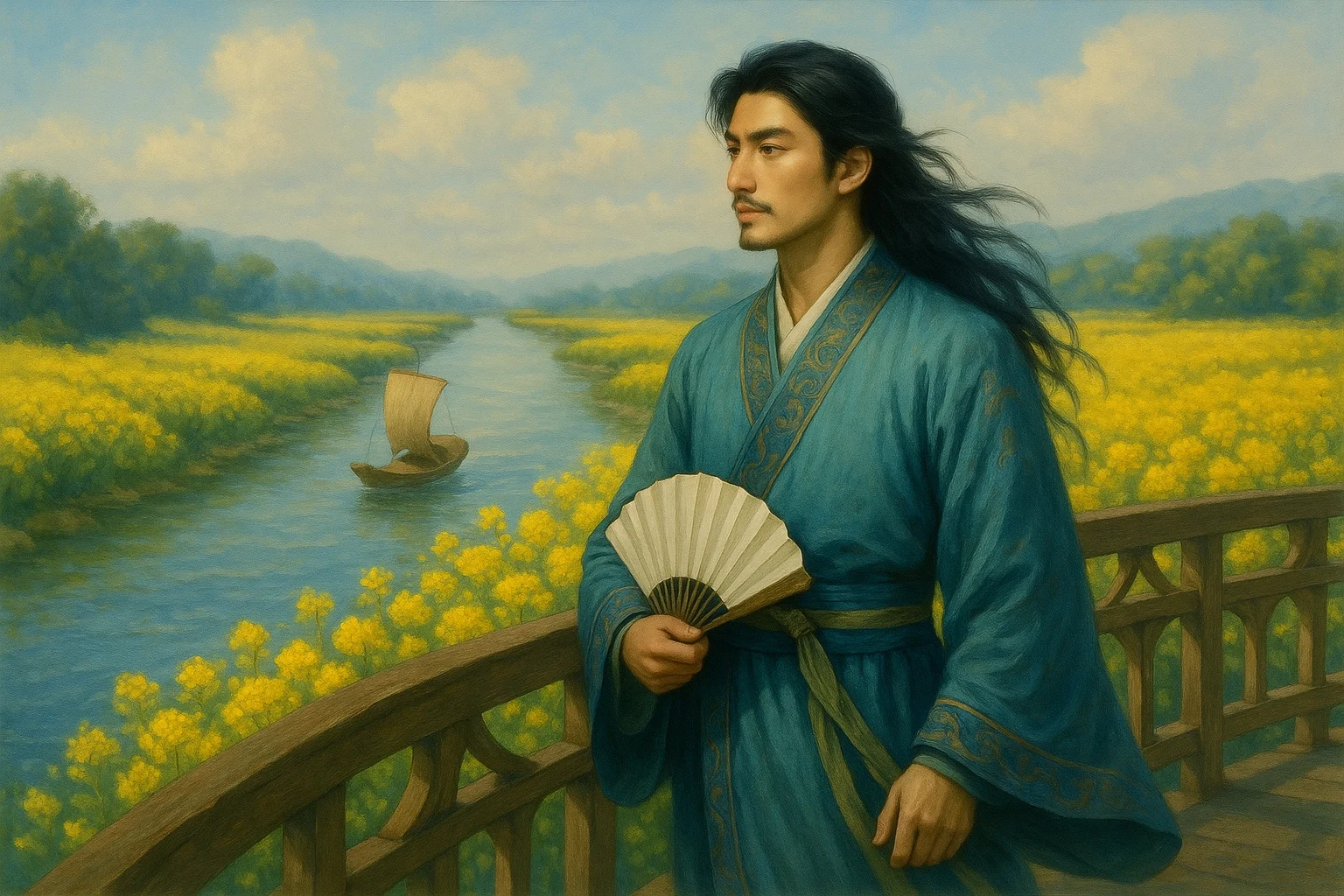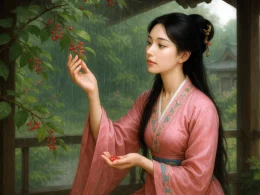The immortal leaves his moonlit vines,
Eastward to take an office’s chains.
Yet still he’ll dwell by sapphire tides,
And gaze where white clouds roam unchained.
At dusk, gibbons wail through river skies,
Insects shrill over cold marshland.
When you stroll Mirror Lake’s blue guise,
Cast out a fishing line for me on sand.
Original Poem
「送侯山人赴会稽」
崔峒
仙客辞萝月,东来就一官。
且归沧海住,犹向白云看。
猿叫江天暮,虫声野浦寒。
时游镜湖里,为我把鱼竿。
Interpretation
Composed by Cui Dong upon seeing his friend Recluse Hou off to assume an official position in Kuaiji, this poem tenderly depicts the moment when a hermit leaves seclusion for bureaucracy. Through twilight river scenes, ape cries and insect chirps, the poet expresses both parting sorrow and shared longing for reclusive life—revealing their profound friendship and mutual admiration of noble character. More than a farewell poem, it intertwines aspirations of withdrawal with realities of officialdom, its restrained language baring genuine emotion.
First Couplet: "仙客辞萝月,东来就一官。"
Xiān kè cí luó yuè, dōng lái jiù yī guān.
You, immortal guest, bid moonlit vines farewell,
Eastward now to take an official post.
The opening addresses Hou as immortal guest (仙客), elevating his purity and detachment. Moonlit vines (萝月) paint his hermitage—a world of tangled greenery and clear moonlight, rich with natural charm. Bid farewell marks his decisive turn from mountain solitude to worldly duty, the plain phrasing take an official post belying the life-altering transition. In these lines, admiration blends with reluctance.
Second Couplet: "且归沧海住,犹向白云看。"
Qiě guī cāng hǎi zhù, yóu xiàng bái yún kàn.
Though you'll dwell now in the shifting sea,
Your gaze still drifts to untethered clouds.
Here, metaphors crystallize: the shifting sea (沧海) symbolizes the volatile official world, while untethered clouds (白云) represent the freedom Hou leaves behind. The couplet's tension lies in though (且) and still (犹)—even immersed in bureaucracy, Hou's spirit remains aloft. Through his friend's duality, Cui Dong voices their shared ideal: true integrity transcends circumstance.
Third Couplet: "猿叫江天暮,虫声野浦寒。"
Yuán jiào jiāng tiān mù, chóng shēng yě pǔ hán.
Apes wail across dusk-veiled river skies;
Cold marsh insects shrill beneath wild reeds.
The scene pivots to the farewell moment. Apes wailing (猿叫), a classical motif of journeying sorrow, echoes through the vast dusk-veiled river (江天暮), amplifying loneliness. Cold marsh insects (野浦寒) sharpen the autumn desolation, their chirps mapping the harsh road ahead. Nature's voices fuse with human emotion, the landscape itself mourning the departure.
Fourth Couplet: "时游镜湖里,为我把鱼竿。"
Shí yóu Jìng hú lǐ, wèi wǒ bǎ yú gān.
When you roam Mirror Lake's embrace,
Hold my fishing rod there in my stead.
The close lingers on Mirror Lake (镜湖), a famed Kuaiji landmark symbolizing unspoiled beauty. Hold my fishing rod is deceptively simple—since Cui Dong cannot join Hou, he asks his friend to act as his proxy in their shared pastoral dream. This request, at once wistful and intimate, lifts the poem from melancholy into enduring camaraderie, circling back to Hou's immortal essence.
Holistic Appreciation
The poem carries a tone of serene elegance and profound sentiment. The opening line uses "immortal guest" to describe the friend, portraying both his ethereal demeanor and the poet's admiration for his noble character. Though ostensibly a farewell for an official journey, the poem avoids bureaucratic language entirely, instead weaving natural landscapes and reclusive imagery to express emotion—revealing the poet's greater emphasis on moral purity and kindred spirits. Elements like twilight, gibbon calls, and insect murmurs, along with "Mirror Lake" and "fishing rod," construct a farewell scene that is at once tranquil, poignant, and richly poetic, embodying Cui Dong's signature style of understated grace, ethereality, and deep feeling.
Artistic Merits
The poem's language is refined yet unadorned, its meaning subtle and far-reaching, adept at conveying emotion and character through natural imagery. Without overt expressions of sentiment, the poem nonetheless brims with lingering affection, blending scene and feeling seamlessly. It particularly excels in merging the ideals of reclusion with the emotions of parting, embedding feeling in scenery and revealing aspiration in emotion—showcasing a poetic temperament that transcends worldly concerns in pursuit of spiritual freedom.
Insights
This poem is not merely a farewell piece but a lyrical expression of noble character and aesthetic ideals. It teaches us that even while navigating worldly duties, one can still cherish the serenity of nature and the freedom of the spirit; true friendship lies not in shared paths but in shared values and mutual understanding. Amid life's clamor, maintaining inner peace and moral elevation is the ideal realm pursued by both the poet and his "immortal guest."
About the Poet

Cui Dong (崔峒, dates of birth and death unknown), a Tang Dynasty poet from Anping, Hebei, was active during the Dali era (766 - 779). Along with Sikong Shu, Lu Lun and others, he was known as one of the "Ten Talents of Dali." His poetry primarily consists of five-character regulated verse (wulü), characterized by an elegant and subtle style. The Complete Tang Poems preserves 48 of his works. His poetic style resembles Liu Changqing's but appears more solitary and austere, reflecting the transition from the vigorous grandeur of High Tang poetry to the introspective quality of Dali-era verse.











